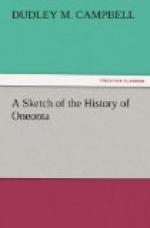+-----------------+ | “CAKES AND BEER | | FOR SALE HERE.” | +-----------------+
After the farmer had sold or bartered away his wheat or other produce, he generally returned with a load of goods for the village merchant.
CHAPTER III.
Prominent among the early settlers of Oneonta was Jacob Dietz, who removed into the settlement from Schoharie county about the year 1804. Mr. Dietz was early appointed a justice of the peace, and continued in office either by appointment or election for a great length of time. He was active in the affairs of the town and an energetic man of business. He was a long time in mercantile business, and his store, which was situated where now stands the brick building occupied by the First National Bank, was the center of a lively trade for those times. Mr. Dietz accumulated an extensive estate, and reared a large family of children. He became the owner of extensive tracts of land, some of which are now occupied by the streets and residences of the village. Some of his representatives are now living in the west and are deservedly esteemed where they reside.
At about the date last mentioned, one Schoolcraft erected a modest structure on the site of the Susquehanna House. Schoolcraft’s house became in a short time the leading tavern of the community, where poor grog and worse food were dispensed to the villagers and wayfarers, doubtless much to the gratification of their primitive tastes.
About the same period, 1804-5, one Joseph Westcott, from the present town of Milford, erected a store nearly opposite the residence of D.M. Miller. These stores—Dinninny’s, mentioned in the preceding chapter, Dietz’s and Westcott’s—were all of the most primitive order, and, especially the first named, contained but a meagre stock of goods, the stock generally consisting of a barrel of New England rum of the most violent nature, several old bull ploughs, a little crockery ware, a few cooking utensils, and a small amount of dry goods. There was but little money and the merchant’s trade was carried on mostly in the way of barter, the tradesman exchanging his merchandise for grain, lumber and shingles.
Early in the history of the town, a Mr. Walling, the grandfather of J.R.L. Walling, located to the east of Oneonta creek, near where his descendant above named now lives. One Newkirk also settled on Chestnut street, on the lot adjoining Philander Lane’s. Lawrence Swart settled on the farm now owned and occupied by Henry Wilcox, about the same time that Jacob Dietz came into the settlement.[A]
[Footnote A: There were other families among the settlers by the name of Hillsinger, Couse, Whitmarsh, Harsen, Sullivan, White and Morrell.]




